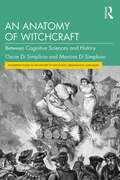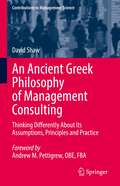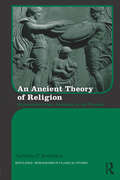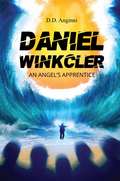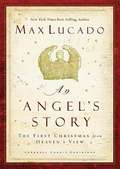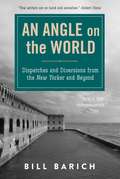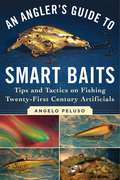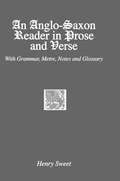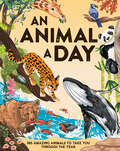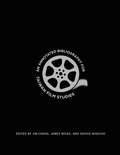- Table View
- List View
An Anatomy of Witchcraft: Between Cognitive Sciences and History (Routledge Studies in the History of Witchcraft, Demonology and Magic)
by Martina Di Simplicio Oscar Di SimplicioMuch has been written on witchcraft by historians, theologians, philosophers, and anthropologists, but nothing by scientists. This book aims to reappraise witchcraft by applying to it the advances in cognitive sciences. The book is divided into four parts. Part I ("Deep History") deals with human emotions and the drive to represent witches as evil female agents. Part II ("Historical Times") focuses on those rare state and church repressions of malefice, which, surprisingly, did not feature in Islamic lands. Modern urbanization dealt a blow to the rural civilizations where accusations of witchcraft were rife. Part III ("In the Laboratory") applies neuroscience to specific case studies to investigate the personification of misfortune, the millenary stereotype witch = woman, the reality of evil, and the phenomenon of treasure hunting. Part IV ("Millenials") wonders whether intentional malefic hatred in a closed chapter in the history of humanity. An Anatomy of Witchcraft is ideal reading for students and scholars. Given its interdisciplinary nature, the book will be of interest to scholars from many fields including evolutionary psychology, anthropology, women’s history, and cognitive sciences.
An Anchor for the Soul: Help for the Present, Hope for the Future
by Ray PritchardPeople have honest doubts and questions about God that deserve solid answers. How do we explain the Gospel of Jesus Christ in a way we can all understand? Ray Pritchard has updated this best-selling presentation of the gospel in a clear, straightforward way using simple language and clear Scripture references. An Anchor for the Soul is written with doubters, seekers, and skeptics in mind. In a clear, straightforward presentation, he answers questions such as: What is God like? How can I know Him? Who is Jesus and what did He do? What does it mean to be a Christian? Through stories and illustrations, Pastor Pritchard very personally, yet gently, challenges his readers with the Good News of Jesus Christ.
An Anchor for the Soul: Help for the Present, Hope for the Future
by Ray PritchardPeople have honest doubts and questions about God that deserve solid answers. How do we explain the Gospel of Jesus Christ in a way we can all understand? Ray Pritchard has updated this best-selling presentation of the gospel in a clear, straightforward way using simple language and clear Scripture references. An Anchor for the Soul is written with doubters, seekers, and skeptics in mind. In a clear, straightforward presentation, he answers questions such as: What is God like? How can I know Him? Who is Jesus and what did He do? What does it mean to be a Christian? Through stories and illustrations, Pastor Pritchard very personally, yet gently, challenges his readers with the Good News of Jesus Christ.
An Ancient Commentary on the Book of Revelation
by P. TzamalikosThis is a new critical edition, with translation and commentary, of the Scholia in Apocalypsin, which were falsely attributed to Origen a century ago. They include extensive sections from Didymus the Blind's lost Commentary on the Apocalypse (fourth century) and therefore counter the current belief that Oecumenius' commentary (sixth century) was the most ancient. Professor Tzamalikos argues that their author was in fact Cassian the Sabaite, an erudite monk and abbot at the monastery of Sabas, the Great Laura, in Palestine. He was different from the alleged Latin author John Cassian, placed a century or so before the real Cassian. The Scholia attest to the tension between the imperial Christian orthodoxy of the sixth century and certain monastic circles, who drew freely on Hellenic ideas and on alleged 'heretics'. They show that, during that period, Hellenism was a vigorous force inspiring not only pagan intellectuals, but also influential Christian quarters.
An Ancient Greek Philosophy of Management Consulting: Thinking Differently About Its Assumptions, Principles and Practice (Contributions to Management Science)
by David ShawManagement consultancy practice is particularly concerned with helping clients implement strategic organisational change. But what exactly are organisations, and management consultancy interventions in them? Management consulting is said to be a knowledge-intensive industry. But what kind of knowledge do management consultants possess, and how far can we rely on it? Management consultants are often criticised for unethical exploitation of their clients. But how ought management consultants to behave in order to meet acceptable ethical standards? These are questions about the philosophical topics of ontology, epistemology and ethics. The ancient Greek philosophers thought deeply about these topics, and their ideas remain fresh and relevant even to so modern a subject matter as management consulting. Writing between the end of the sixth and the end of the fourth century BCE, these philosophers were drawing upon an intellectual tradition that was very different from our own, and were responding to social and economic conditions that were wholly unlike ours. Approaching these philosophical questions from a perspective that is radically different from our own, their work provides a rich resource for novel thinking about management consulting. From the speculations of the Presocratic philosophers Heraclitus, Parmenides, Leucippus and Democritus about the nature of the universe to the thought of Socrates, Plato and Aristotle about the nature of human beings, this book uses the work of these great thinkers as a lens through which to study major philosophical questions about management consulting. Examined in this way, many established assumptions and principles of management consultancy practice seem questionable, and new ways of thinking possible.
An Ancient Theory of Religion: Euhemerism from Antiquity to the Present (Routledge Monographs in Classical Studies)
by Nickolas RoubekasAn Ancient Theory of Religion examines a theory of religion put forward by Euhemerus of Messene (late 4th—early 3rd century BCE) in his lost work Sacred Inscription, and shows not only how and why euhemerism came about but also how it was— and still is—used. By studying the utilization of the theory in different periods—from the Graeco-Roman world to Late Antiquity, and from the Renaissance to the twenty-first century—this book explores the reception of the theory in diverse literary works. In so doing, it also unpacks the different adoptions and misrepresentations of Euhemerus’s work according to the diverse agendas of the authors and scholars who have employed his theory. In the process, certain questions are raised: What did Euhemerus actually claim? How has his theory of the origins of belief in gods been used? How can modern scholarship approach and interpret his take on religion? When referring to ‘euhemerism,’ whose version are we employing? An Ancient Theory of Religion assumes no prior knowledge of euhemerism and will be of interest to scholars working in classical reception, religious studies, and early Christian studies.
An Angel At My Shoulder: True Stories of Angelic Experiences
by Glennyce S. EckersleyThough angels have been part of our culture and our history for centuries, they have been forgotten in recent times, diminished to the level of christmas trinkets and the playthings of children. Until recently few would admit encountering angelic beings. Yet this extraordinary book shows angels are returning - and being acknowledged - once again. Here are true stories of countless ordinary people being rescued by angels, being comforted and healed by them, feeling their presence in the face of death and often appearing to little children. These tales are drawn from such countries as Britain, Australia, Ireland and the United States showing angels can be found all around the globe, helping people and often changing their lives completely. Full of warm and uplifting stories, An Angel At My Shoulder suggests it is more than time to reconsider our view of angels, to let them back into our hectic mechanized world and to realise we are never alone. . .
An Angel At My Table: The Complete Autobiography (Virago Modern Classics #141)
by Janet FrameNOW AN AWARD-WINNING FILM ON NETFLIX 'One of the great autobiographies written in the twentieth century' MICHAEL HOLROYD, SUNDAY TIMES'Irresistibly readable, commendably honest' FLEUR ADCOCK, TIMES LITERARY SUPPLEMENT'The Janet Frame of An Angel at My Table is a writer of exceptional sensitivity' LOS ANGELES TIMESAfter being misdiagnosed with schizophrenia as a young woman, Janet Frame spent several years in psychiatric institutions. She escaped undergoing a lobotomy when it was discovered that she had just won a national literary prize. She then went on to become New Zealand's most acclaimed writer. As she says more than once in this autobiography: 'My writing saved me.'This edition contains all three volumes of Frame's autobiography: To the Is-Land, An Angel at My Table and An Envoy from Mirror City.'One of the most beautiful and moving books I have ever read . . . A masterpiece . . . Janet's autobiography had an enormous effect on me. She struck a blow right to my heart' JANE CAMPION, GUARDIAN
An Angel Changed my Life
by Theresa CheungAngel expert Theresa Cheung is back with a new collection of inspiring true stories about how our guardian angels can offer help, protection and direction in times of trouble and, by so doing, transform our lives forever. An Angel Changed My Life brings together a fascinating anthology of ordinary people's extraordinary experiences where angelic intervention has inspired them to turn their lives around. Uplifting, true-life accounts of miraculous healing and guidance include stories of near-death experiences, such as the teenager who found himself unaccountably brought to dry land after almost drowning; the grandmother who discovered superhuman strength when her grandchild faced mortal danger, and the grieving widow who found comfort, support and purpose from an angel presence. These stories bring us a much-needed tonic in a troubled world and show us how angels can bring a sense of wonder and gratitude to our lives, and give us a meaning and purpose we never knew we had.
An Angel Healed Me
by Theresa CheungTheresa Cheung in an expert in the field of angels and divine healing. This, her latest collection of amazing true stories, focuses on the physical and emotional help people have experienced from unexplained or ethereal sources at times when they have been at their most vulnerable. With chapters such as 'Manifest a Miracle' and 'An Angel at My Bedside', the book tells of remarkable incidents where angels have appeared in hospital wards, at difficult births, during near-death experiences, and when someone actually dies, easing their journey from the corporeal to the spirit world. The common thread running through all these miraculous stories of healing from the inside out is that every angelic encounter provided the recipient with a strength, courage and power they never knew they had.
An Angel In The Flame: A Tale of Two Saviors
by Gene WilkesThis is a gripping tale of two saviors. Two men whom God chose to rescue his people. Two men anyone familiar with history would call heroes among their people. Two men who represent the best and worst the human experience have to offer. One was the Arnold Schwarzenegger of his day. The other was a humble carpenter who led no army or held no office, yet in his death caused a cosmic ripple that touches the edges of our universe today. Both are part of God’s story to capture the hearts of men and women with his love, but only one lived out God’s ultimate purpose for his life. This tale is about Samson and Jesus.
An Angel Saved Me
by Theresa CheungSunday Times bestselling angel author Theresa Cheung is back with a new collection of extraordinary stories revealing how our guardian angels intervene in our lives, bringing us a lifeline of hope, healing and spiritual transformation. The honest and astonishing accounts in An Angel Saved Me are proof that, even in our darkest hour of need, we are never alone. These remarkable stories of miraculous intervention remind us that there is so much more to this life than we can ever know. Even in a troubled world, angels can bring us protection, guidance and a sense of hope, comfort and purpose when we need them the most.
An Angel Spoke to Me
by Theresa CheungTheresa Cheung, author of the Sunday Times bestselling, An Angel Healed Me, returns with a brand new collection of astonishing true stories about the many different ways our guardian angels speak to us and reveal their divine messages of comfort, guidance and inspiration. The remarkable and honest accounts in An Angel Spoke to Me are proof that extraordinary things can and do happen to ordinary people, healing and transforming their lives in the process. These remarkable stories of angelic intervention remind us that there is so much more to this life than we will ever know. From out of nowhere, in our troubled world, our angels can send us much needed messages of comfort, mercy, goodness and love from the other side.
An Angel at My Table: The Complete Autobiography (Virago Modern Classics Ser. #2353)
by Janet FrameThe autobiography of New Zealand's most significant writerNew Zealand's preeminent writer Janet Frame brings the skill of an extraordinary novelist and poet to these vivid and haunting recollections, gathered here for the first time in a single volume. From a childhood and adolescence spent in a poor but intellectually intense railway family, through life as a student, and years of incarceration in mental hospitals, eventually followed by her entry into the saving world of writers and the "Mirror City" that sustains them, we are given not only a record of the events of a life, but also "the transformation of ordinary facts and ideas into a shining palace of mirrors."Frame's journey of self–discovery, from New Zealand to London, to Paris and Barcelona, and then home again, is a heartfelt and courageous account of a writer's beginnings as well as one woman's personal struggle to survive.This book contains selections from the long out–of–print collection entitled Janet Frame: An Autobiography (George Brazillier, 1991), which itself was originally published in three volumes: To the Is–land, An Angel at My Table, and The Envoy from Mirror City.
An Angel in Sodom: Henry Gerber and the Birth of the Gay Rights Movement
by Jim ElledgeHenry Gerber was the father of American gay liberation. Born in 1892 in Germany, Henry Gerber was expelled from school as a boy and lost several jobs as a young man because of his homosexual activities. He emigrated to the United States and enlisted in the army for employment. After his release, he explored Chicago's gay subculture: cruising Bughouse Square, getting arrested for "disorderly conduct," and falling in love. He was institutionalized for being gay, branded an "enemy alien" at the end of World War I, and given a choice: to rejoin the army or be imprisoned in a federal penitentiary. Gerber re-enlisted and was sent to Germany in 1920. In Berlin, he discovered a vibrant gay rights movement, which made him vow to advocate for the rights of gay men at home. He founded the Society for Human Rights, the first legally recognized US gay-rights organization, on December 10, 1924. When police caught wind of it, he and two members were arrested. He lost his job, went to court three times, and went bankrupt. Released, he moved to New York, disheartened. Later in life, he joined the DC chapter of the Mattachine Society, a gay-rights advocacy group founded by Harry Hay who had heard of Gerber's group, leading him to found Mattachine.An Angel in Sodom is the first and long overdue biography of the founder of the first US gay rights organization.
An Angel to Guide Me: How Angels Speak to Us from the Beyond
by Glennyce S. EckersleyGlennyce Eckersley is one of our most loved angel experts. In her wonderful new book, An Angel to Guide Me, she explains how angels communicate with us through the five senses of sight, hearing, smell, taste and touch, as well as the mysterious sixth sense of intuition. Amazing true stories collected from around the world show how many of us have had incredible angelic experiences that appear to have been tailor-made for us, speaking to us individually through the senses in the ways we recognise and understand the best. These stories are illustrated by inspirational exercises, affirmations and quotations, which will help readers to connect with the angels themselves. From 'Visions of Angels' to the 'Touch of Angels' and 'Angels of the Soul', it becomes clear that the angels are indeed all around us, ready to communicate with us through the gateways of our senses whenever we are willing to welcome them into our lives.
An Angel's Apprentice: An Angel's Apprentice (Daniel Winkcler Ser.)
by D. D. AnginniAn Angel's Apprentice is a fictional work of youth literature set in the world of fantasy and the story tells of an epic battle among the most powerful angels of Eden (the Seals) and how Daniel Winkcler will wake these creatures in order to save Humanity. You hold in your hands a powerful artefact capable of transporting you into a fantastical adventure with the oldest and most powerful beings that have ever lived on Earth: the Celestial Seals. Enter into Daniel Winkcler's universe, a fifteen year old kid who turns out to be the key figure in an ancient battle. Guided by his master, Jihlava, and counting on his friends by his side, Daniel will need to learn how to control his new powers, take on daunting enemies and wake up the oldest and most invincible Seals leveling out the balance of powers between the Rebels and the Resistence. Only then will he prevent a new Armageddon from destroying Humanity. The gateway you are holding will take you through a succession of battles, chases, mysticism, legends, tournaments, treasure hunts and romance that are enough to take away the breath of any hero. Get ready for this unforgettable journey and open up the book. Have fun!
An Angel's Story: The First Christmas From Heaven's View
by Max LucadoIn this book, Max Lucado uses his imagination and scripture to tell the Christmas story from heaven's view with all of the spiritual warfare that might have occurred.
An Angle on the World: Dispatches and Diversions from the New Yorker and Beyond
by Bill BarichSpanning over thirty years of writing, An Angle on the World is a wonderful collection of articles that cross the globe and introduce readers to many characters, introduced as only Bill Barich can. As said by Time magazine, Barich's touch is always "artful and compassionate."Broken up into two sections, Barich shares stories of the people, from those that have shaken him to the core, to others from a much lighter place.As he notes in his introduction, "I've spent much of my writing life indulging curiosity, throwing myself into situations and subcultures to gain an education and acquire my own angle on the world. The dispatches collected here arose from that desire."From the troubles in Northern Ireland and the homeless in San Francisco to the US-Mexico borders, Barich went to the people to find the "real story. These are his dispatches. "They all explore stories the press had ignored or covered in a desultory way, at least in my view." While doing his research for these pieces, Barich would speak with grocers, butchers, and even barbers to get his story, knowing that they would give him the truth, as opposed to those that would try to skew reality for someone writing for a magazine.Barich also shows the other side of things, as he speaks about diversions of a "lighter fare." From meetings with Jerry Garcia and trips to Barbados and Culebra, readers will enjoy the work that has kept Barich busy for so many decades, and helped him become one of the most enjoyable writers of our time.An Angle on the World is a terrific compilation from a brilliant writer that offers a raw sense of reality from the people who live it. No filter, no fluff, just the truth as Barich told it. They're real and genuine stories, and shown from a caring point of view that make this collection a definite can't-miss.
An Angler's Guide to Smart Baits: Tips and Tactics on Fishing Twenty-First Century Artificials
by Angelo Peluso Mark SosinFishing is one of the oldest continually practiced pastimes in history. But like almost everything else in our modern era, it too has been greatly influenced by ever-changing technology and scientific advances. With busy lives, it's often impossible for anglers to keep up with constantly evolving equipment. In An Angler's Guide to Smart Baits: Tips and Tactics on Fishing Twenty-First Century Artificials, veteran fisherman Angelo Peluso helps to navigate these often unsure waters of modern baits and how to fish them. Peluso takes readers through all the essential elements. Among the topics he explains, in depth, are: the appeal and purpose of materials used in modern lure construction, including hi-tech, durable plastics, acrylics and other polymers, and new-age finishes that give impressions of life; the modern science of both hard and soft baits; the sensory appeal of modern baits; and how to maximize a bait?s appeal to yield the most strikes and increase an angler's catch ratios. Including advice and input from expert lure designers, scientists, and manufacturers, An Angler's Guide to Smart Baits is an essential read for every modern fisherman.
An Anglo-Saxon Reader in Prose and Verse: With Grammatical Introduction, Notes, And Glossary (classic Reprint)
by SweetFirst published in 2005. Routledge is an imprint of Taylor & Francis, an informa company.
An Anglo-Welsh Teaching Dynasty: The Adams Family from the 1840s to the 1930s
by William E. MarsdenOver a period of about 90 years, six members of the Adams family, originally from Pembrokeshire, were teachers in Wales and England. This account of their experiences and methods illustrates educational continuity and change during a century of development.
An Animal a Day: 365 Amazing Animals to Take You Through the Year
by Miranda SmithDiscover a fascinating new animal for every day of the year! The perfect gift for animal lovers aged 6 and up.New day, new animal!In this gorgeous calendarized collection, you'll travel through the incredible ecosystems and habitats of our wild planet and meet 365 of the amazing animals that call it home.Dive into the oceans to find whales and giant squid, soar though skies with eagles and snowy owls, race across the African savanna with lions and wildebeest—and so much more. Each day&’s entry is filled with fascinating facts and breathtaking illustrations that bring animals to life. You'll encounter familiar favorites, plus find out new sides to critters you thought you already knew and learn about completely new animals.Packed with engaging info, this book also features information about conservation and how we can protect endangered animals and their environments.It's the ultimate gift for any animal lover, from age 6 to 106!
An Animal for Alan
by Edward R. RicciutiQuoting from the book: Alan wants a pet animal, an animal that he can keep at home. When Alan and his father go for a walk in the country, Alan sees several wild animals that he wants to take home. But Alan learns on this walk, and later at the zoo, which wild animals must live in their natural habitats and which animals can be kept as pets. Woven into this lively, easy-to-read story are many interesting facts about animals, such as the way in which killdeer protect their young, why a fawn is usually safe during the first few days of its life, and why monkeys need the company of other monkeys. The sprightly drawings bring freshness and humor to Alan's experiences in his search for a pet.
An Annotated Bibliography for Taiwan Film Studies
by James Jim Cheng Wicks Noguchi SachieCompiled by two skilled librarians and a Taiwanese film and culture specialist, this volume is the first multilingual and most comprehensive bibliography of Taiwanese film scholarship, designed to satisfy the broad interests of the modern researcher. The second book in a remarkable three-volume research project, An Annotated Bibliography for Taiwan Film Studies catalogues the published and unpublished monographs, theses, manuscripts, and conference proceedings of Taiwanese film scholars from the 1950s to 2013. Paired with An Annotated Bibliography for Chinese Film Studies (2004), which accounts for texts dating back to the 1920s, this series brings together like no other reference the disparate voices of Chinese film scholarship, charting its unique intellectual arc. <P><P>Organized intuitively, the volume begins with reference materials (bibliographies, cinematographies, directories, indexes, dictionaries, and handbooks) and then moves through film history (the colonial period, Taiwan dialect film, new Taiwan cinema, the 2/28 incident); film genres (animated, anticommunist, documentary, ethnographic, martial arts, teen); film reviews; film theory and technique; interdisciplinary studies (Taiwan and mainland China, Taiwan and Japan, film and aboriginal peoples, film and literature, film and nationality); biographical materials; film stories, screenplays, and scripts; film technology; and miscellaneous aspects of Taiwanese film scholarship (artifacts, acts of censorship, copyright law, distribution channels, film festivals, and industry practice). Works written in multiple languages include transliteration/romanized and original script entries, which follow universal AACR-2 and American cataloguing standards, and professional notations by the editors to aid in the use of sources.
